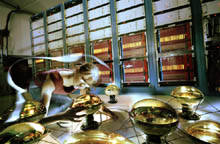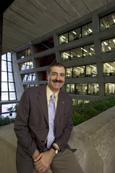 | Wednesday, March 16, 2005 |
|
Wednesday, March 16 THERE WILL BE NO Proton Driver General Meeting THIS WEEK THERE WILL BE NO FERMILAB ILC R&D MEETING THIS WEEK 3:30 p.m. DIRECTOR'S COFFEE BREAK - 2nd Flr X-Over 4:00 p.m. Fermilab Colloquium - 1 West Speaker: J. Rigden, Washington University Title: Einstein: The Standard of Greatness
Thursday, March 17 |
|
Extended Forecast |
Secon Level 3 |
|
Wednesday, March 16 Italian Wedding with Meatballs Diner Style Patty Melt $4.75 Southern Fried Chicken $3.75 Beef & Broc $3.75 Greek Chicken Panini with Feta Cheese $4.75 Sicilian Style Pizza $2.75 Grilled Chicken Bowtie in a Tomato Cream Sauce $4.75 The Wilson Hall Cafe now accepts Visa, Master Card, Discover and American Express at Cash Register #1.
Wilson Hall Cafe Menu |
| Fermilab Today is online at: http://www.fnal.gov/today/ Send comments and suggestions to today@fnal.gov Fermilab Today archive Fermilab Today PDF Version Fermilab Result of the Week archive Fermilab Safety Tip of the Week archive Linear Collider News archive Fermilab Today classifieds Subscribe/Unsubscribe to |
|
Neutrinofest Brings Scientists, Writers Together |
|
NeutrinoFest will bring together top neutrino scientists and science writers to talk about Nature's most elusive particle on April 18, 2005, at the annual gathering of the American Physical Society in Tampa, Florida.
"This seemed like the perfect time for such a workshop," said Janet Conrad, neutrino physicist and NeutrinoFest Organizer. "It celebrates the combination of the World Year of Physics, the 75th birthday of Pauli's idea of the neutrino, and the completion of the APS Study on the Future of Neutrino Physics." The idea for NeutrinoFest grew out of the APS Neutrino Study, which represents a consensus of over 300 authors on the future direction of neutrino studies. "As we were writing the report, we realized we had all this great information on neutrinos and wanted a way to let the public share our excitement," Conrad said. The event, targeting science writers and educators, "promises to be fun and informational, a great chance to build connections," says Conrad. Seven scientists from all disciplines of neutrino research will cover the breadth of the field.
For more information, go to the
NeutrinoFest website.
Please RSVP by April 1,
2005 to neutrinofest@nevis.columbia.edu.
|
|
FYI: AIP Bulletin of Science Policy News, March 11, 2005 GAO Documents Improvements in Visa Application Process
On February 16, the Government Accountability Office (GAO) released a report entitled, "Border Security: Streamlined Visas Mantis Program Has Lowered Burden on Foreign Science Students and Scholars, but Further Refinements Needed." The title succinctly summarizes the report's main message: Improvements enacted by the Departments of State and Homeland Security have made the visa application process far less burdensome to foreign students and scientists than it was in the wake of the September 11, 2001 terrorist attacks. But the report also points out that some of the improvements have yet to be fully implemented.
|
|
From BBC News, March 15, 2005 Public 'must engage with science'
Patricia Hewitt, the UK Trade and Industry Secretary, has called for a greater public engagement with science. Her statement comes after a public poll showed only 40% of UK adults consider themselves well informed about science.
The Mori poll also revealed that seven out of 10 adults think that the media sensationalises science issues.
|
|
INFN/Fermilab Press Release Italian, US cosmologists present alternate explanation for accelerating expansion of the universe: Was Einstein right when he said he was wrong? Why is the universe expanding at an accelerating rate, spreading its contents over ever greater dimensions of space? An original solution to this puzzle, certainly the most fascinating question in modern cosmology, was put forward by four theoretical physicists, Edward W. Kolb of the U.S. Department of Energy's Fermi National Accelerator Laboratory, Chicago (USA): Sabino Matarrese of the University of Padova; Alessio Notari from McGill University (Canada); and Antonio Riotto of INFN (Istituto Nazionale di Fisica Nucleare) of Padova (Italy). Their
Over the last hundred years, the expansion of the universe has been a subject of passionate discussion, engaging the most brilliant minds of the century. Like his contemporaries, Albert Einstein initially thought that the universe was static: that it neither expanded nor shrank. When his own Theory of General Relativity clearly showed that the universe should expand or contract, Einstein chose to introduce a new ingredient into his theory. His "cosmological constant" represented a mass density of empty space that drove the universe to expand at an ever-increasing rate.
When in 1929 Edwin Hubble proved that the universe is in fact expanding, Einstein repudiated his cosmological constant, calling it "the greatest blunder of my life." Then, almost a century later, physicists resurrected the cosmological constant in a variant called dark energy. In 1998, observations of very distant supernovae demonstrated that the universe is expanding at an accelerating rate. This accelerating expansion seemed to be explicable only by the presence of a new component of the universe, a "dark energy," representing some 70 percent of the total mass of the universe. Of the rest, about 25 percent appears to be in the form of another mysterious component, dark matter; while only about 5 percent comprises ordinary matter, those quarks, protons, neutrons and electrons that we and the galaxies are made of.
|
|
EPS High Energy Particle Physics Prizes 2005 The EPS HEPP Board is calling for nominations for the EPS High Energy Particle Physics Prizes in 2005. These prizes include the High Energy and Particle Physics Prize, the Young Physicist Prize, the Gribov Medal and the Outreach Prize. A complete list of prizes and regulations is available online. The deadline for nominations is April 15, 2005. The prizes will be awarded in a ceremony on July 25, 2005 during the Internation Europhysics Conference on HEPP, Lisbon.
International Folk Dancing
|

